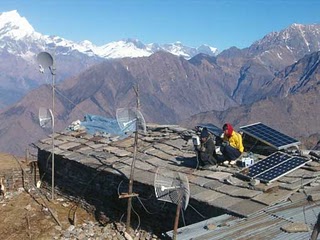Once one of the world’s most ruthless and notorious (and fictional) oil barons, J.R. Ewing, of the TV show Dallas fame, has turned his back on black gold to spend his retirement selling eco-friendly solar panels. Why? Because he, and the company he represents in commercials, can make money. And actor Larry Hagman has totally converted his own home to solar power.
The ethical minefield that’s prevented so many business owners from going green, and also making a profit, is being defused. With venture-capital dollars flowing slightly more freely, and increased acceptance of green products’ quality and, thus, their lower prices, sign-companies see the current market is ready for energy-saving products and plan to incorporate the green ethos into their business plans.
SouthWest Signs and Harbinger know the wisdom of basing their business on their green goals. They tell how they’ve profited from their environmental focus in ST’s September issue.
Mahabir Pun
While I was investigating sign companies that had invested in the green movement, I came across the inspiring story of Mahabir Pun. Making a profit is essential, but measures of success also include the social, environmental and economic impacts of business. Mahabir provide meaningful leadership to his region in Nepal and achieves results far beyond profits.
Nangi Village, where Mahabir Pun was born, rests high in the Himalayan foothills of western Nepal. After a seven-hour climb, you might reach Nangi from the nearest road. No telephone lines have reached it. Despite this, Nangi is connected to the world. Mahabir and hundreds of volunteers have made it happen, via donated computer equipment, solar panels and valuable time.
As a child, Mahabir’s village school didn’t have paper, pencils or books. The family moved to Nepal’s lowlands to obtain a better education for him. He eventually finished high school and became a teacher for 12 years. Then, a scholarship led him to a bachelor’s degree at the University of Nebraska at Kearney. Then, in 1992, after more than 20 years away, he returned to Nangi, determined to make things easier for others.
Advertisement
He helped Nangi’s leaders establish a village high school. Mahabir would trek to a village a few days away to email pleas for donations. In 1997, Australians donated four used computers. He and the village set up hydro generators in a nearby stream to power them and began teaching computer classes at the Nangi high school. More computers followed.
However, Nangi was without telephone connection to Pokhara, which was 20-kilometers away and had Internet connection to Kathmandu, the capital. Mahabir emailed the BBC, which, in 2001, asked viewers for ideas. Within a year, volunteers from Europe and the U.S. were helping him rig a wireless connection between Nangi and the neighboring village of Ramche, using TV dish antennas mounted in trees on a mountain top. Grants soon helped improvise mountaintop relay stations, powered by solar panels and wind generators, and a link to Pokhara. By 2003, Nangi was online.
The web spread the word, and backpacking volunteers smuggled in more donated computer equipment into the hills. The Nepalese government had banned the import of computer equipment and use during a Maoist rebel insurgency; suspicious rebels had destroy the equipment in other villages, but, strangely, have never wrecked Nangi’s operations.
Mahabir relentlessly continued. His wireless network embraced more villages. He distributed used computers to schools, connected them to the Internet and taught teachers how to use them.
Local health workers use Wi-Fi to consult specialists. Villagers market local products such as buffaloes, honey, teas and jams. Trekkers pay to use campsites outfitted with solar-powered hot showers.
In Kathmandu, Mahabir has also convinced parliament to legitimize and democratize wireless technology in Nepal.
Advertisement
What Mahabir has wrought
The villagers mostly rely on sustainable farming. They raise cattle, goat and chicken. They grow corn, potatoes, vegetables and beans for food. Other than rice, they don’t buy food from the outside world. Military service – as the fearsome and fearless Gurkhas – and work in Gulf countries were their only sources of cash income. So, Mahabir says, the people aren’t haunted by economic standards that compel them to compete with each other to “get ahead,” whatever that means. They have enough food to eat and enough money to buy clothes and necessities. Most of them are happy with their lives.
The new technologies Mahabir has brought to the villages has enabled them to prepare to compete in the “materialistic” world, as he puts it. A better communications system is important, he says, because it connects a community and a nation to the world, to better understand other human beings.
However, Mahabir, now in his fifties, insists he’s not in charge of anything. People can take care of themselves. But, he still has plans – crossbreeding yaks with cows, who produce dung (a great fertilizer), and another growing trees, for firewood.
You can find out more about, and even donate to, Mahabir’s projects at www.napalwireless.net.



 Tip Sheet1 week ago
Tip Sheet1 week ago
 Ask Signs of the Times3 days ago
Ask Signs of the Times3 days ago
 Photo Gallery1 day ago
Photo Gallery1 day ago
 Real Deal1 week ago
Real Deal1 week ago
 Benchmarks6 days ago
Benchmarks6 days ago
 Editor's Note2 weeks ago
Editor's Note2 weeks ago
 Women in Signs1 week ago
Women in Signs1 week ago
 Photo Gallery1 week ago
Photo Gallery1 week ago









